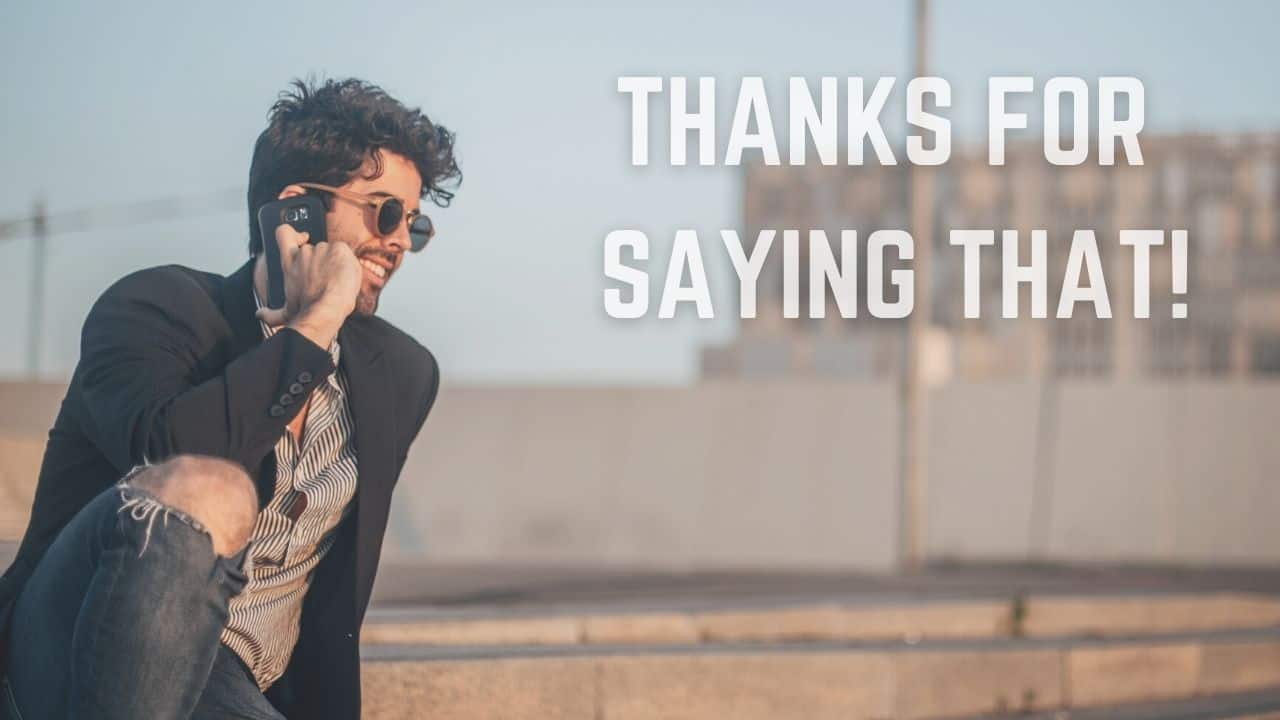Showing thanks is an integral part of who we are as human beings.
In fact, a study by Harvard found that people who often express their gratitude tend to be happier than those who just focus on the negative aspects of their lives.
They tend to feel more optimistic and to have a better feeling about who they are. Moreover, they usually exercise more and have fewer doctor visits.
This is not to mention that people who display gratitude have better relationships with those around them. They make better managers, better friends, and better partners.
So, the bottom line is that you should say thanks whenever you can.
Now, there are many things you can be thankful for. You can thank someone who does you a certain service or shows you a kind act. But, even a kind word should merit a thank you.
This is why there is the common expression “thank you for the kind words.”
What does “thank you for the kind words” mean?
“Thank you for the kind words” is something you say when you want to show gratitude to someone else who has said something nice to you. You are literally thanking them for their kind words.
How to use the expression “thank you for the kind words”

“Thank you for your kind words” is a versatile creature. You can use it anytime you want to thank someone for something they said.
Fan: My God, I can’t believe it’s you. I’m such a big fan. I must have seen every film you’ve done, and I love every single one of them.
Celebrity: Awww… Thank you for the kind words. It’s why I do what I do. For the fans like you out there who keep me going.
However, “Thank you for your kind words” is also a bit formal. So, you should use it with people you don’t know, people you work with, or in situations that require you to act formally.
Boss: Excellent job yesterday. You really impressed me with your presentation, and I think it’s safe to say that you blew the client away. They couldn’t wait to sign up with us.
Employee: Thank you for the kind words. I was only doing my job.
Let’s take a minute to see what makes it formal.
For starters, there is no explicit subject in that expression. You don’t use any pronouns or anything.
Secondly, there is no action or emotional verb here. And, as we mentioned before, one of the main differences between formal and informal writing is that formal writing tries to take emotions out of the equation.
It tries to do without action verbs, to toss away any subjective feelings, and to focus on the objective results in front of you and abstract them if possible.
To understand this second point better, let’s see how you can make the expression more informal.
Boss: Excellent job yesterday. You really impressed me with your presentation, and I think it’s safe to say that you blew the client away. They couldn’t wait to sign up with us.
Employee: Thank you so much for saying that. I’m delighted to hear it.
Seems less stoic, right?
And, using “thank you for the kind words” would just sound weird with a friend.
Friend #1: Hey, that’s a beautiful new car you got. Why don’t you take us for a ride?
Friend #2: Thank you for the kind words. Sure thing, let’s go on a ride.
Can you feel how awkward it is when used with someone close to you?
We also said that you should use this expression in situations that require formal behavior.
For instance, let’s say that you are with your friend, but they are introducing you to their boss.
Friend: Excuse me, I just wanted to introduce my friend Natalie. She’s a wizard behind the computer. She’s done somethings that I had thought impossible before I saw her.
You: (To your friend) Thank you for the kind words. (To the boss)But, she is right. If you’re looking to add someone to your IT team, I’m your girl.
Boss: Is that so?

Problems with “thank you for the kind words”
Well, there aren’t really any problems with this expression.
Instead, some people are worried that if they use it, it might be misconstrued.
And, like anything else in language, context plays a large role here.
”Thank you for the kind words” being used sarcastically

For instance, you could use “thank you for the kind words” sarcastically. If someone says something unflattering about you, you could handle the whole thing as a joke.
Person: I know who you are. You are that famous guy from all the movies. God, I hate your movies. They never have any point to them. And, you’re always the worst part in them.
Celebrity: Awwww… Thank you for the kind words. It’s why I do what I do. For the fans like you out there who keep me going.
Even though the celebrity’s response above is exactly the same as the one from before, you can tell that the response here is quite different.
In the earlier example, the celebrity was sincerely thanking the other person.
However, in this example, they’re being sarcastic. If anything, the celebrity is surreptitiously telling the vocal cinephile the following.
“I appreciate that you don’t like my movies, but maybe they aren’t for you. If you’re not my target demographic, then so be it.
But, I have my fans who do come to see my movies, and so long as they are happy with the movies I do, that’s all that matters to me.”
Obviously, if you’re going to use this expression sarcastically, then you want to reserve that for friends and family. Sarcasm has no place in the workplace.
Friend #1: Hey man, did you do that painting? Friend #2: Yeah. What do you think? Friend #1: I think it’s the ugliest thing I’ve ever seen. My eyes are hurting just from watching it. Friend #2: Wow… Ok. Thank you for the kind words. Please don’t hold back and feel like you have to be polite. Tell me how you really feel.
And, if we’re honest, we all have that one friend who will say something inappropriate or who will just speak their mind without any filter.
Let’s just hope that they get sarcasm.
”Thank you for the kind words” coming across as a canned response

We all use canned responses in our everyday lives. They make things easier, lubricate social interactions, and take a load off of our shoulders.
When someone asks us how we are doing, we don’t give them an entire spiel about the ins and outs of our lives.
We just go on autopilot and respond with “fine.”
Similarly, when someone says something nice about us, we might default to “thank you for the kind words” as an automatic reflex.
But, there are occasions when it might not be the best response.
These are the situations where the other person is expecting you to give them a heartfelt response or at least a personalized one.
Take a look at the following example
Person #1: So, I’ve been meaning to tell you this for some time now, so here it goes. I think I love you. I know it’s too soon, but it’s how I feel. How do you feel?
Person # 2: Wow… Well, thank you for the kind words I guess.
Seems wrong, right?
The bottom line is that there are some situations where a simple canned response won’t do it, and you will have to dig deeper to find the appropriate thing to say.
The more informal cousin of “thank you for the kind words”

We know that “thanks for the kind words” is formal. Is there an informal alternative?
Actually, there are several. The trick is to make the expression less wordy, use action verbs, and insert a pronoun or two if you can.
Here are a couple of examples
- “Thanks for saying that.”
- “I appreciate that you said that.”
- “That’s so nice of you to say.”
You get the picture.
Let’s look at these alternatives in action.
Friend #1: Wow, that is a beautiful dress. Friend #2: Aww… thanks for saying that.
Teammate #1: I don’t know about you guys, but I know that Micheal is good enough to take the winning shot. I have faith in him, and you all should too. He’s done nothing but have our backs all season, and it’s time we had his.
Michael: Thanks buddy. I really appreciate that you said that.
Guy: I just wanted you to know that I like the way you smile. There is something so infectious about it. And, I was wondering if you would like to go out with me sometime? Girl: That’s so nice of you to say. Sure, I would love to go out with you. What are you doing next Saturday?

Hey fellow Linguaholics! It’s me, Marcel. I am the proud owner of linguaholic.com. Languages have always been my passion and I have studied Linguistics, Computational Linguistics and Sinology at the University of Zurich. It is my utmost pleasure to share with all of you guys what I know about languages and linguistics in general.

